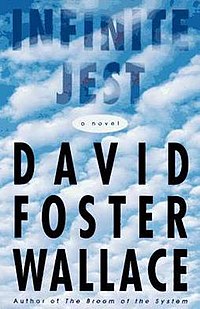 As longtime readers know, I'm a big David Foster Wallace guy. So I was thrilled to hear about Infinite Summer, an online challenge/discussion forum dedicated to reading, discussing and celebrating Wallace's sprawling, daunting and ground breaking Infinite Jest over the summer. The "official" reading period is June 21-Sept 22. The "Guides" of the effort have calculated this working out to 75 pages a week.1
As longtime readers know, I'm a big David Foster Wallace guy. So I was thrilled to hear about Infinite Summer, an online challenge/discussion forum dedicated to reading, discussing and celebrating Wallace's sprawling, daunting and ground breaking Infinite Jest over the summer. The "official" reading period is June 21-Sept 22. The "Guides" of the effort have calculated this working out to 75 pages a week.1
I'll be rereading along with the effort -- in fact I've gotten an early start. I'd love to blog the whole thing, but that seems unlikely given my summer schedule. But I will no doubt have something more to say.
If you are tempted, but not sure, consider the following both a pitch and caveat. The book for the most part is eminently readable, but the book as a whole is challenging. The narrative is written in a nonlinear, sometimes seemingly random timeline. To confuse things further, the years in the near future world Wallace imagines are not designated by numbers, but by corporate sponsors2, increasing the degree of difficulty in following the action. That said, the individual "chapters"3 by and large are easy to read.
Second point, understand that the story is not the major point here. Wallace is exploring ideas without explicitly laying out what those ideas are. We're not supposed to include spoilers, but let me just say this: You know how in Pulp Fiction you never find out what's actually in the briefcase? There's a lot of that sort of thing in Infinite Jest. Wallace drops plentiful clues to explain the McGuffins, but speculating about what happened ultimately is beside the point.
If the above has enticed and/or failed to dissuade you, a few tips to get you started:
- Consider buying the book. Yes, libraries have copies, but trust me, this is a book you will want to go back to. It's also one of the few novels in which I've written margin notes.
- Use two book marks -- one for the text and one for the endnotes. A fair amount of action/explanation/McGuffin-clue-giving happens in the endnotes. I used a sticky note in the endnote section that I moved with each note read.
- Have a dictionary handy. Wallace drops a lot of fifty cent words in some sections.4
- Consider doing a little reading ahead of time. Various sources have their recommendations for DFW gateway readings. Mine are the story "Octet" from the collection Brief Interviews with Hideous Men and the essay "Joseph Frank's Dostoyevsky" from the collection Consider the Lobster. You will find embedded therein almost Jerry Maguire-style mission statements that will help understand what Wallace may be up to. If you really want to go geeky about it, consider some of the theses posted on The Howling Fantods.
1Though the final 94 pages of that 1079 is endnotes which you really need to read in conjunction with the text -- no really, you need to -- making it difficult to calculate exactly how much you are reading.a
- 1Of course a post about DFW must have footnotes. Of course.
3The book isn't divided into chapters per se, but is more of a collection of vignettes and epistles, most of which are designated only by a date, but some of which have some sort of heading not a few of which (i.e. the headings, not the dates) are comically long. Said vignettes/epistles range from a paragraph to a score of pages or more.
4Particularly those concerning central character Hal Incandeza who is described as a "lexical prodigy."



2 comments:
God, I've been meaning to read this monster for years, especially after his death, and just never get around to it. Thanks for the reminder, though.
I strongly recommend that you at least jump in for 100 pages or so and see if you get hooked. As someone who loves to feast on great writing, I think you will get into it.
Post a Comment